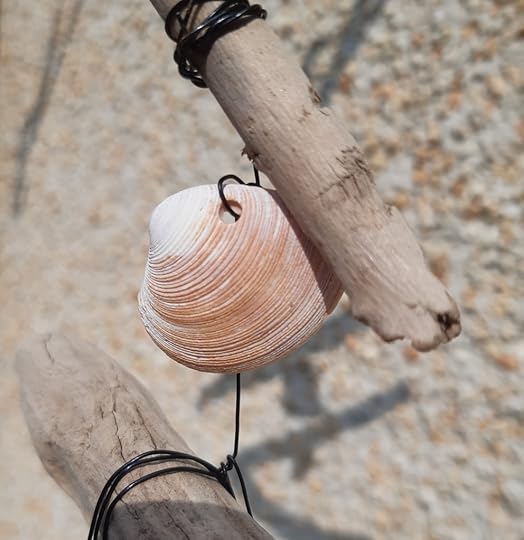Clam, Clammy, Close – Their Word History
Hello,
This week’s investigation is with thanks to friend of the blog, Rick Ellrod, who asked me one day if clammy weather is related to clams. Summer seems the right time to investigate and I threw in close too as I’ve always wondered about that.
Let’s start with the clam. It’s a bivalve mollusk and the word for it arose around 1500 in English but it was an earlier word in Middle English where it described a vice or clamp in the late 1300s and came from an even earlier variant clamm (to grip) in Old English. All of these arose from variations of klam (to squeeze together, constrict, or embrace) in German, Old High German, and Proto-Germanic which suggests that all the words relate back to the mollusk itself which was known for tightly closing its shell.
 A clam shell in my Valhalla ladder
A clam shell in my Valhalla ladderI was listening to a podcast last night (“No Such Thing as a Fish” by the Qi Elves) which mentioned clams and that they are used in some cities to check water quality. The clams and scallops are filter feeders and they shut their shells if they detect pollutants in the water. Clever clams.
Now for clammy weather. Clammy, meaning soft and sticky (how you feel in such weather) dates to the late 1300s but it comes from clay rather than the mollusk. Middle English had clam (sticky, muddy), Old English had claem (sticky clay), Flemish had klammig and Low German had klamig (sticky, damp). Old English also used claemen – to plaster so it appears that clay was used to plaster buildings and walls. It suggests the association with stickiness is what gave us clammy weather, rather than the clam shellfish.
Clammy, humid, weather is often referred to as close. While Ireland isn’t even close (pun intended) to the Caribbean in terms of humidity we have plenty of moisture in the air during all seasons so it’s common to hear people complaining about being unable to sleep during a close night. In researching this one I discovered the word is used in the USA too to describe hot, humid, airless conditions (thanks, Word Detective!)
The verb to close is one of the oldest in English, appearing around 1200 from Old French and Latin where claudere meant to shut or surround with walls. Like many verbs it evolved into an adjective with time to describe being closed in or secret, initially and later for things which are near each other.
It wasn’t until the late 1500s that close was used to describe the stuffiness of a closed room without fresh air circulating. Around the same time it was used for similar weather conditions outside that closed room.
Word Detective has also unearthed a charming list of other words for close – muggy, sulky, sticky, soggy, and pothery (definitely one for me to discuss another day).
Until next time, happy reading, writing, and wordfooling,
Grace (@Wordfoolery)



